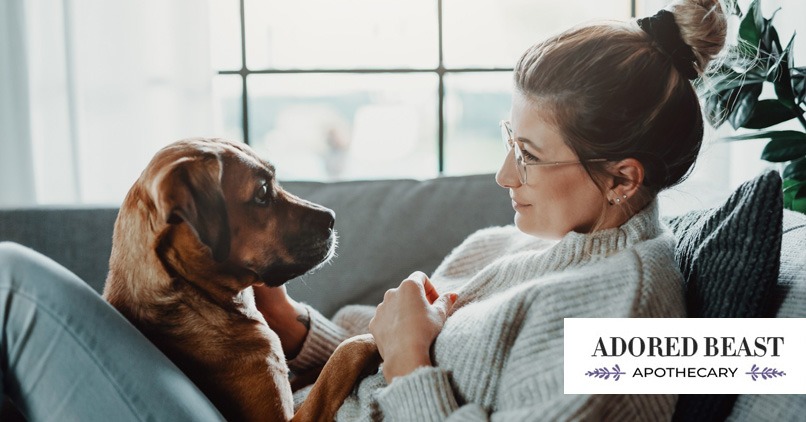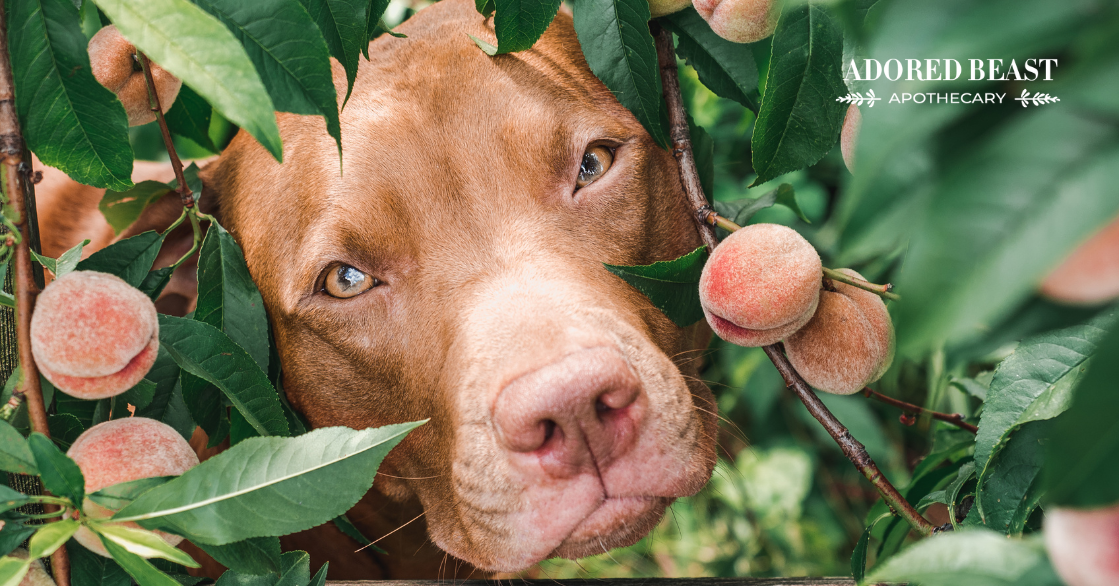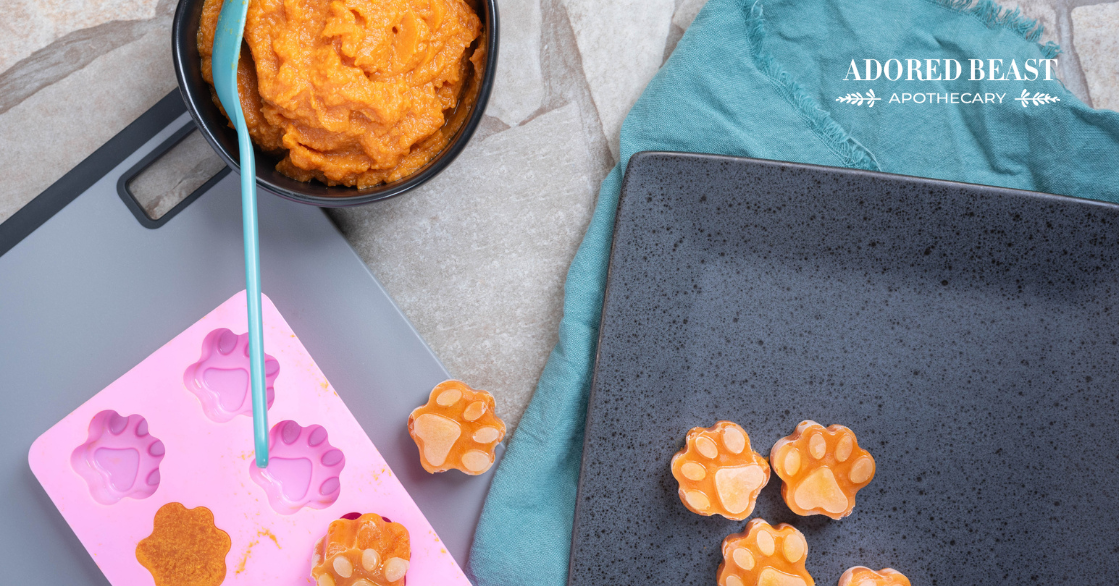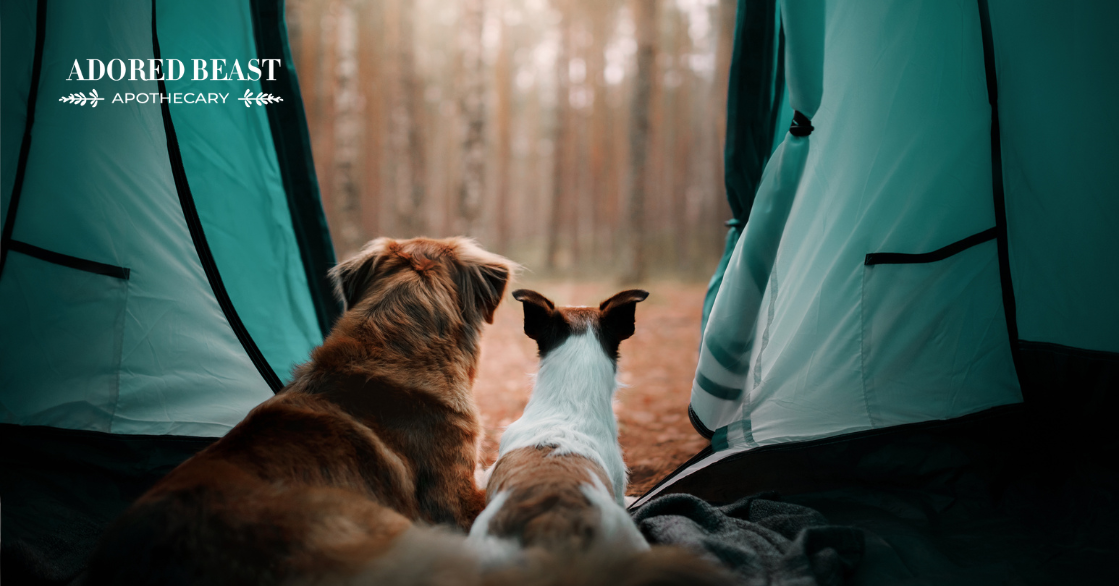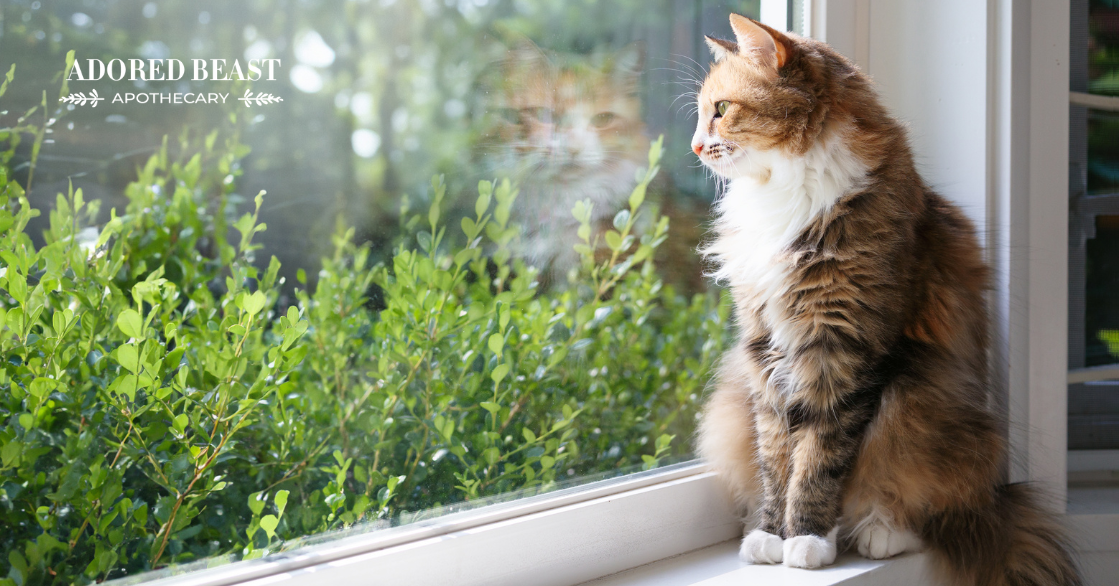Cancer in dogs, cats, horses (any animal, really), and humans is looked at as this scary, elusive thing, when in reality, it is something that happens every day in every body.
As an owner and formulator of a natural health supplement company for animals, and someone who has practiced in my own veterinary clinic for more than 20 years, if you were to ask me if we have products that can help the body be at its best and function at its optimum to try to derail cancer, the answer would be yes!
Are there incredible gifts from nature that have centuries of intuitive healing properties that know just what to do when trauma, destruction, pollution, and havoc create an unbalanced state of homeostasis? Absolutely! But there is one thing, perhaps the most important thing, that I can’t formulate for you, or find for you, or create for you, that is paramount in derailing cancer or any chronic health condition. That thing is you, your dog’s, your cat’s, your horse’s, or your family’s emotional state of being.
The reason my company or any other natural healthcare company out there can’t provide that for you is because you can’t formulate it. You can’t go online and purchase a bottle because this fantastic, powerful, cancer fighting and cancer preventing tool is FREE – it is innate in us all. Is it always easy to access? No, not at all, but that’s a good thing because it forces us to learn so many new things, like how to get still to find gratitude no matter what our circumstance may be, or how to create a new set of lenses so that we look at the world with awe and beauty and a new set of headphones altering what we allow ourselves to hear. Opening our heart to the beauty and love that surrounds us is intrinsically in us, but has not been taught to us by our educational system or mainstream media. Re-wiring or re-learning conditional habits and patterns that have been imposed, not through bad people per se, but most often for reasons of gain, or narrow focus with business being behind it.
The Impact of Fear and Stress on Cancer in Dogs, Cats, and People
From the outside, we may look like we have evolved, but the majority of us live in a place of constant stress, and that stress keeps us in an emotional hormonal space where the body feels there is a threat. In this state, every single part of our bodies, every single cell, is in the place to fight or flight, even if it’s as simple as a traffic jam or a fight with your boss. Our bodies still, to this day, evolution or not, do not know the difference of that heightened stress compared to being chased by a saber tooth tiger. All our hormones are screaming run or fight, but at the same time we are sitting still in our car or having to put on a smile on our face to someone our bodies feel we should punch! It’s truly like the body has one foot on the gas but our brain has the other foot on the brake! When our bodies are in this state there is no room for growth, creativity, joy, or healing, and we are vulnerable to the shifts of cellular destruction and/or disease, AKA cancer!
When my team asked me to write an article on cancer in dogs, I thought what more could I contribute that’s not already been written, been researched, been podcasted, or had documentaries made. I was really stumped, until one of my interns said, why don’t you not only teach your approach to “treating” cancer but talk about the way you look at “cancer” in general. This was coming from someone who not only had a dog with cancer but who also went through breast cancer herself. She said, just talk about the thousands of animals you have seen with cancer and what you have taught me. Your view, based on those years of clinical experience working with it, treating it, chasing it, and trying to understand the dynamics of the word itself, and that impact on the lives of the entire family, including, then, inevitably, the dog.
I want to be really clear that what I am going to write about in no way negates any other views on the research, prevention, beliefs, or treatments that all of the many brilliant, dedicated people are doing. It’s simply another approach.
I have chosen to go outside the box, not just with conventional treatment and philosophy, but outside the holistic box as well.
The reason I want to write about this is because you guys are getting great information, BUT unfortunately there are just not enough experienced integrative veterinarians to go around. Animals are not only dying from cancer, but worse, suffering, and therefor their human parents are suffering right along with them. There is nothing worse than watching the love of your life spend their last years, months, or days in that place.
So today, while we are researching and studying every possible way to combat cancer, to me there lies a gap. That gap is “what do we do until the cure IS found,” because I believe whole heartedly it will be!!
In the meantime, I want to try and help fill in that gap and spread the word that you can both support the longevity of a being with a “cancer” diagnosis as well as support an amazing quality of life as long as that life chooses to be on this earth.
Don’t worry, we are going to actually talk about the protocol we used in my vet clinic, but first let’s look at what “treating cancer” means, or “remission,” or “cure,” or how about just “living with cancer.”
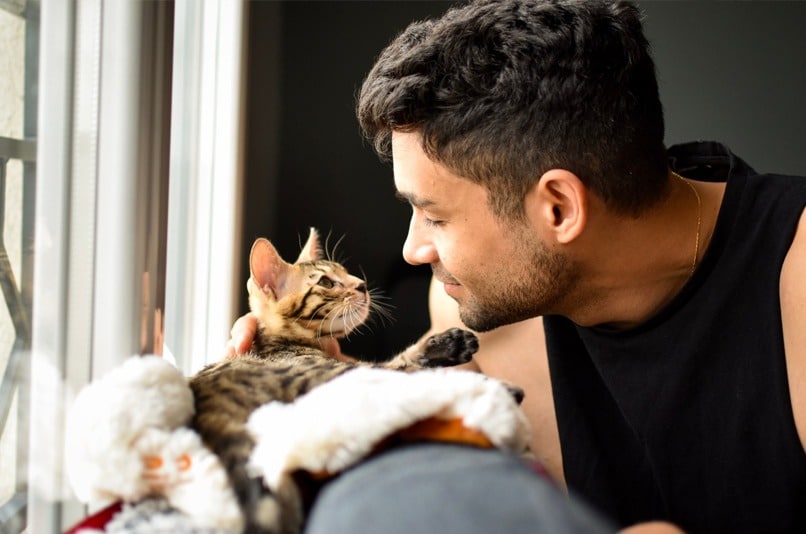
Living with Cancer
Research shows that types of cancer cells are always in the body, and if they are “triggered,” this is when the the major problem starts. Thankfully, we have isolated many things to help with those triggers, like enzymes to decrease chronic, systemic inflammation, adaptogenic herbs to balance stress, ketogenic diets, antioxidants, and the list goes on.
I’d like to pose this question to you: if types of cancer cells are always somehow present, and the human body has a cell death rate of 50-70 billion per day, and we regenerate 40-50 billion new cells every day, how do we know that the growth and death of those cancer cells have not come and gone or ebbed and flowed through as the natural balance constantly occurs?
What makes us believe that, as soon as any diagnosis is made, the body (if given the tools) can not regain that balance? If too much attachment stays with the fear of someday getting a diagnosis or the actual diagnosis itself, it can slow down the body’s ability to regain balance, either through fearfully choosing a drug with detrimental side effects or cellular havoc from chronic stress and worry.
There is something to be said for being focused and unfocused on said dis-ease. There are times for research and for educating, and then there are times we just need to be in the place of knowing that it’s gonna be alright, no matter what that looks like, and that you are doing your best so you can try and let the fear around the word cancer go.
It really is all about balance. How can you believe the body will regain balance if the mind and heart are being smothered by fear, therefore really keeping it out of balance?
Let’s try for a minute to look at it from the point of view of what’s in front of us, instead of worrying about the label or, even as harsh as it sounds, the outcome.
Cancer does not always mean an immediate death sentence, but as with anything, we can’t always control the outcome. But what we can do 100% is control the experience and the choices we make within that journey.
From what I know about dogs (or any animals), their moment-to-moment experience is basically how they live and to them, that is what is ultimately the most important.
I do not know many dogs who would choose longevity at any cost over being able to eat raw meaty bones and have the most fun and cuddle time possible with their human family.
Do not get me wrong! The day I picked up my great dane English mastiff, I told her I expected nothing less of her than at least 15 years, and that is precisely why this article is so important to me – because it’s coming from a really personal place…
It’s Going to be Alright
Over the 20 years in my vet clinic, I was told I used to consistently use the phrase “it’s going to be alright.” I did not even realize I was saying it and had no idea the power it had until client after client started telling me that it just simply gave them a sense of relief. That instead of just being in a place of reacting or treatments being done to their dog or cat, they were suddenly at ease and felt supported that they had choices that would come from a much deeper place. Some just said they knew that no matter what the outcome was it was going to be ok, not even because they gave up hope but somehow they gave up the fear.
That phrase was always so easy for me. I just always somehow knew how to support them, medically and emotionally, what to suggest, what to use, when to do it… but I want to share something with you – I absolutely did not feel that way with my own animals!
When I was 4, I had my own dog torn out of my arms and killed by another dog. I felt powerless and guilty that I could not save her. I felt like it was my fault. That experience lead me to dedicate my life to doing whatever I could to save animals and support as many people as possible not to have to experience that feeling.
Not the feeling or experience with death, but the experience that they are powerless in what happens to their beloved animals.
Yet, I have basically lived my entire life with my own animals in that polar opposite feeling, terrified of doing the wrong thing, basically out of control in trying to control everything. After all, I was the one people came to for help, I should be able to breeze right along, right? Nope!
That was, until about 4 years ago, when some major poop hit the fan in my life and I had to make that leap into what my mother called “walking my talk.”
I want a huge favour from you guys. Just for this article, I want to label cancer something different, like “deep immune confusion that needs to be reset” or “the body is in a confused state” or even “poop has hit the fan” if you guys want it more intense.
If that was truly happening to a body, and you could talk to that body like a friend, what would we say?
- Would we scare the crap out of it and cause more confusion or reactivity?
- Or, would we simply try and find a way to remind the body that it’s ok, that it can rebalance?
What feels better? To think of cancer in dogs or cats as a terrifying death sentence OR as a confused body that has lost its balance.
We need to somehow try not to be as attached to the outcome and more focused on what is happening now, meaning at this moment: how is my dog or cat feeling, how is he acting, is she playing? How am I feeling? Am I terrified, am I manic on searching for the cure, or am I trying to be alright so that I can make choices from a grounded place, but more importantly be as present with my animal as best I can each and every moment?
Cancer in Dogs & Cats: Letting Go of the Fear
Over the years, as a society we have talked ourselves in and out of so many things that sometimes it’s hard to know just what to believe. Our food has gone from being called peasants food if we ate local food and not fast food, and now we are all the way back around to the knowledge that a peasant or local, seasonal diet is best.
The best, most innovative “cure all drugs” that have been double blind studied out the ying-yang are yanked off shelves after 5 years because of side effects like chronic kidney failure.
Researchers and cutting edge studies are saying chemo can be fatal and harm more people than it cures, yet many doctors and veterinarians are telling us we or our dog undoubtedly will die without it.
So how, who, and what do you believe?
You need to try and learn how to believe YOU – you, and the signs, symptoms, and energy your animals are relaying to you.
Why? Because every body is different and you need to know what is working for YOUR DOG, YOUR CAT, AND YOU! NATURAL OR COMPLETELY CONVENTIONAL!
We are all in a collective energy. When your animal or any loved one is diagnosed with that label, you are not alone in that fear, terror, or anger. It’s what it provokes. It is what we have been taught by well intentioned people that it needs to provoke, but don’t forget fear is also how CNN sells news and how drug companies sell drugs. We can be mindful and try our best not to go down that rabbit hole.
Those negative emotions hold you in a place of disconnection, keeping you away from:
- Being able to clearly assess what’s happening
- Making choices out of what you really what rather than that
- Most importantly, building the love connection with your dog.
And those negative emotions can actually make you sick, which is the very last thing your loving pet would want!
So, how do we try and not allow our fear or anger to take over?
It’s totally healthy to let it out! Go scream, or punch a pillow, cry your eyes out, or go work out… but just try not to get stuck there. And believe me, sometimes that’s not an easy ask.
In our next cancer in dogs article we will be talking about what you can do to get grounded and make choices that fit not only your dog, cat, or horse, but your whole family and your own personal philosophy and beliefs. I will try and share every possible way with the supplements and homeopathic remedies we used in our clinic to support you to feel that no matter what the outcome, it’s going to be alright.

